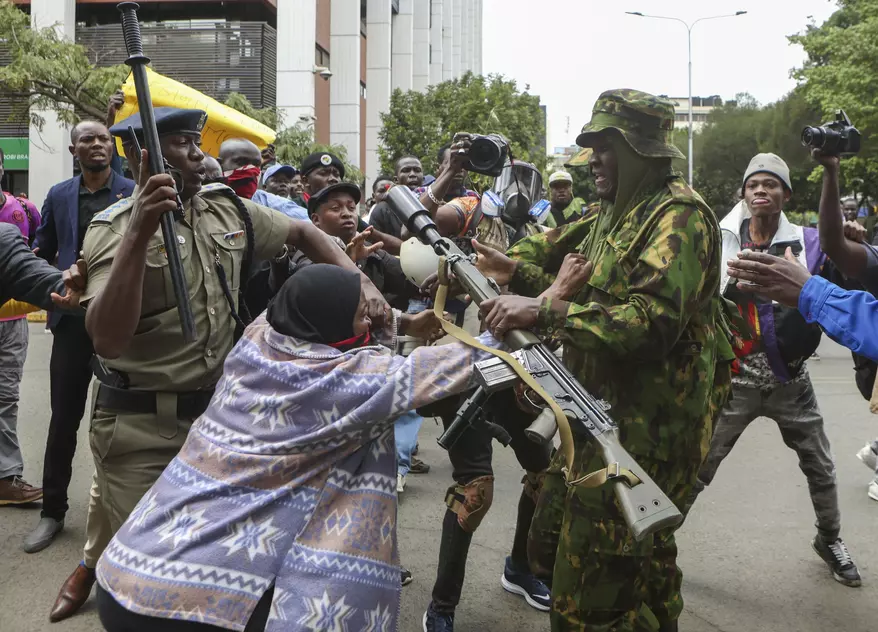 A tense confrontation unfolded in Nairobi following the death of blogger Alberto Ojwang while in police custody, sparking widespread protests that brought parts of the city to a standstill. The unrest, which lasted the better part of a day, saw hundreds of protesters take to the streets demanding justice, accountability, and a transparent investigation into the circumstances surrounding Ojwang’s death. The demonstrations culminated in clashes with law enforcement, during which at least one protester was seen scuffling with a police officer as tensions boiled over.
A tense confrontation unfolded in Nairobi following the death of blogger Alberto Ojwang while in police custody, sparking widespread protests that brought parts of the city to a standstill. The unrest, which lasted the better part of a day, saw hundreds of protesters take to the streets demanding justice, accountability, and a transparent investigation into the circumstances surrounding Ojwang’s death. The demonstrations culminated in clashes with law enforcement, during which at least one protester was seen scuffling with a police officer as tensions boiled over.
Ojwang, a well-known social media figure and political commentator, was reportedly arrested earlier in the week under unclear charges. His family and supporters allege that he was detained without formal charges and denied legal access. On the morning of his reported death, police informed the family that Ojwang had died in custody. However, no immediate explanation was given regarding the cause of death, leading to public outrage and the rapid mobilization of demonstrators across Nairobi.
Protesters gathered outside the central police station where Ojwang was last held, chanting slogans and waving placards that read “Justice for Alberto” and “Stop Police Brutality.” As the crowd grew, tensions escalated. Witnesses described scenes of pushing and shoving, as demonstrators tried to enter the station and police attempted to hold them back with riot shields and batons. Video footage circulating on social media showed one protester in a heated altercation with an officer before being pulled back by fellow demonstrators.
Human rights organizations quickly condemned the incident and called for an independent inquiry. The Kenya Human Rights Commission issued a statement demanding the immediate suspension of the officers involved in Ojwang’s detention and called for postmortem results to be released without delay. Civil society groups also highlighted a troubling pattern of deaths in custody and alleged abuse by law enforcement, calling on the government to implement comprehensive police reform measures.
Late in the day, amid growing pressure and public unrest, authorities confirmed that one police officer had been arrested in connection with Ojwang’s death. While officials have not publicly named the officer, the arrest marks a rare move in a country where police misconduct allegations often go unpunished. The Directorate of Criminal Investigations (DCI) has taken over the case, and a formal investigation is now underway to determine the cause of death and any criminal liability.
Government spokespersons urged calm and promised transparency. In a televised briefing, a senior official from the Ministry of Interior expressed condolences to Ojwang’s family and reiterated the government’s commitment to a full investigation. However, activists remain skeptical, citing previous cases where promises of accountability failed to lead to convictions or structural change.
Ojwang’s death has reignited debate over the role of police in suppressing dissent and targeting critical voices online. The blogger, known for his sharp criticism of public officials and commentary on corruption, had a significant following on digital platforms and was seen as a voice for the youth and marginalized communities. His sudden death has sent shockwaves through Kenya’s online community, with hashtags calling for justice trending across social media platforms.
As the protests subside and the country awaits the outcome of the investigation, pressure continues to mount on the government to deliver justice swiftly and transparently. Human rights defenders have vowed to keep the issue in the public eye and to continue calling for reform in how law enforcement operates, particularly in its treatment of detainees and critics of the state.
The National Police Service has yet to issue a comprehensive statement on the matter, but sources indicate that internal disciplinary processes may follow based on the findings of the DCI’s investigation. Meanwhile, Ojwang’s family is calling for the body to be released for an independent autopsy, citing concerns over the credibility of the official report.
As Nairobi begins to return to normal after a day of disruption and tension, the death of Alberto Ojwang remains a stark reminder of the long-standing concerns over police accountability in Kenya.

